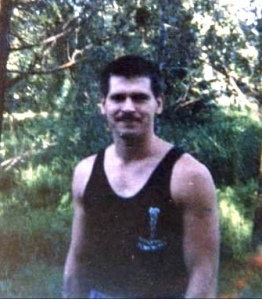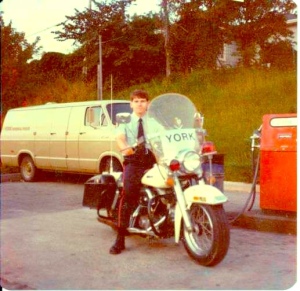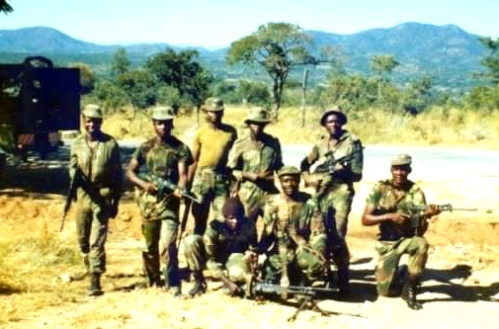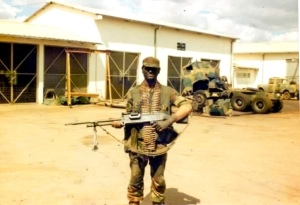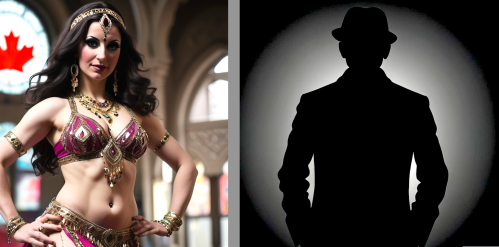
Amy Howerska really was “raised by a pack of trained killers”
Comedian Amy Howerska’s Edinburgh Fringe show in August will be called Sasspot. The publicity blurb for it says she was “raised by a pack of trained killers”.
This understates the truth quite considerably.
I had tea with her.
What this blog does not and cannot represent is the amount of laughter in the recordings. There was a LOT of laughter.
Halfway through, I asked her: “You are allowed to tell me all this, aren’t you?”
“I don’t know,” she said,
“I think when they get married,” I mused, “they are not allowed to have any photos of themselves in the local newspapers?”
“There are no pictures of my dad anywhere on the internet,” said Amy. “You can’t find him online.”
“Is your dad’s surname the same as yours?”I asked.
“No.”
“It’s probably OK, then,” I said. “There was something recently about three people dying on the Brecon Beacons while training. But that’s happening all the time, isn’t it?”
“That’s in my show,” said Amy. “I almost died on the Brecons when I was seven. My dad used to take us camping. Re-living his glory days. With his kids. Climbing the highest point in the Brecon Beacons in the worst weather recorded in over forty years. He set up a sky-diving centre after he left the… military. He had very limited skills.”
“What?” I asked. “Like overthrowing regimes?”
“I think he did do that to get the money to buy a house,” said Amy. “He went and… I’m not sure what I’m allowed to say.”
“When I have met SAS men…” I started to say, “allegedly-ex SAS men… they were…”
“Short!” laughed Amy. “They’re all short and Cockney! I tried to get a quote off Andy McNab for my Edinburgh Fringe poster, but he wasn’t up for it.”
“You know Andy McNab?” I asked.
“I’ve met him at a… at a few funerals,” she laughed. “He’s very charismatic. He’s very short.”
“Were you born into the SAS?” I asked. “When you were an embryo, was your dad in the SAS?”
“No. Let’s call it The Regiment. I asked my dad for some stories the other day. I asked him what his favourite gun was. He told me all these stories of all these fuck-ups. All these training exercises, hostage situations that all went wrong.
“I have quite a dark sense of humour – obviously. When I have been previewing the show, people have been pissing themselves laughing but some have gone Oh my God!
“I did a preview of the show to 100 Marines on a Royal Marine base and there are loads of jokes about Post Traumatic Stress Syndrome, which I think is probably the funniest thing in the show. It’s a bit that goes consistently well.
“All the young Marines’ wives were pissing themselves laughing because now, if someone comes back with Post Traumatic Stress Syndrome, they send them off for CBT – Cognitive Behavioural Therapy – so they found it quite funny. And the young men were laughing as well. But the older wives were: Ooooh! Is she talking about that? It split the room a bit. But I always think you’re doing something right in comedy if you’re splitting the room – maybe 50% howling with laughter, 25% who are confused and 25% who are angry.
“When I was talking to my sister about writing the show and trying to gather memories, she said: Do you remember when dad used to get out his machete and cut an apple up like he was still living in a hole in the desert?
“Some of it is so outlandish it sounds made-up but, actually, it’s watered-down to make it more believable and less mental. I just accepted everything as normal and it wasn’t at all.
“One day he came in and found me and my sister throwing knives at a dart board when we were about eight years old. He said: What you doing??!! What you doing??!! – and then he taught us how to do it properly. He ran a sky diving centre – a drop zone – for years. He’s 66 now and he still sky dives.”
“So,” I said, “you decided to do a comedy show about your dad and his top secret exploits…”
“Well,” said Amy, “it wasn’t like that. I decided to do my first hour-long show about growing up in a sky-diving family – three generations. My parents met at my granddad’s drop zone. My granddad was also in… in The Regiment.”
“When was that?” I asked. “The Second World War?”
“No. He was only six or seven when the Second World War broke out.”
“So he was in Oman?” I asked.
“No, my dad was in Oman and Dhofar..”
I switched the recorder off at this point.
I like to tease.
When I switched the recorder back on again, Amy was laughing…
“When I started talking about my childhood, people were like: That’s fucking batshit! And I thought: Oh, yes, it is! So it has been quite a challenge to make it relatable. the core of the show is really about people’s family relations.”
“So,” I said, “it’s about life in a family. A bit like The Godfather.”
“But with more sky diving.” laughed Amy. “And death. And guns. The show is not about my father. He is in it, but my sister and dad are in it equally; my mum features; Evil Dwarf features; and…”
“Evil Dwarf?” I asked.
“My mum’s father. He’s an ex-sergeant major. That was his nickname in…”
“In what?” I asked.
“The Regiment. The show is about my family, my upbringing.”
“And grassing-up your dad,” I said.
“I’m not grassing him up. He gets off very lightly in it.”
“And in your family…” I asked. “What does your sister do?
“She runs a drop zone. She’s married to a sky-dive champion. My mum’s brother is the Ozzy Osbourne of sky diving: he’s just had so many head injuries. And we call my mum ‘Peggy’ after Barbara Windsor on EastEnders: she’s really sassy and little with big boobs and big opinions and not afraid to say ‘em. It’s all about that, really.”
“So you grew up wanting to be a comedian?” I asked.
“I wanted to be a nun. My family is a bit Jewy, but they thought, to confuse me, they would send me to a convent school when I was little. The nuns were lovely: I think I’m one of the few people with a positive experience of Catholicism and I think I wanted…”
“Why,” I asked, “did your parents send you to a convent school?”
“Because they weren’t very Jewish. Only a bit Jewy. So I wanted to be a nun. I liked the accessories. Madonna was very big at the time. They used to let me swing my rosary around in the playground.”
“Was one of your parents Jewish?” I asked.
“My dad’s father was Jewish. and my mum’s grandmother.”
“So,” I said, “after you got over wanting to be a nun, what did you want to be?”
“A journalist, an actress or a comedy writer. I remember watching Blackadder and thinking: Who writes that? Who’s that Richard Curtis bloke? I loved reading and I loved comedy.”
“Then you should,” I suggested, ‘have become a comedy reader.”
“I came to comedy arse-backwards,” explained Amy. “I came in as a writer. I was writing for an act. I’ve been doing all this for five years, building my way up.”
“And now,” I asked, “you don’t want to write any more? You want to get the orgasm of applause?”
“The most fun you can ever have,” said Amy, “is when there’s a group of you writing something together.”
“If you had to put one thing on your passport as a profession,” I asked, “would it be Writer or Performer?”
“Writer probably,” said Amy.
If, dear reader, I die unexpectedly in a car crash in a tunnel in Paris or a random domestic animal falls fatally on my head in Soho, please draw this blog’s existence to the attention of the police.
PLEASE SHARE THIS BLOG VIA:
